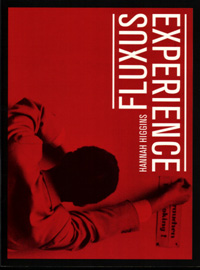Hannah Higgins: FLUXUS EXPERIENCE
Unuversity of California Press, Berkeley and Los Angeles 2002
(book review)
 Hannah
Higgins, the daughter of Fluxus artists Dick Higgins and Alison Knowles,
is a Fluxus scholar. Years of research and scholarship both in Europe
and America led to her completing this interesting and profound analysis
of Fluxus.
Hannah
Higgins, the daughter of Fluxus artists Dick Higgins and Alison Knowles,
is a Fluxus scholar. Years of research and scholarship both in Europe
and America led to her completing this interesting and profound analysis
of Fluxus.
Her motive, beside her family background, was the astonishing fact that Fluxus, this influential post-World War II movement had been left out of the history of art. Some essays and texts were published on it occasionally, Owen F. Smith compiled an exemplary chronology, and an exhibition called In the Spirit of Fluxus was held at Walker Art Center, Minneapolis but on the whole, it did not create a great stir. Art historians did not agree whether this movement was to be considered art or anti-art since it defied systematic approach by embracing a wide variety of works of different forms and media created by a great number of artists from America, Europe and Japan, from the late fifties to the eighties. In fact, the artists, too, failed to agree on the style and substance and significance of what they did and sometimes even disliked each other. Thus it is difficult to form a notion of Fluxus as it requires thinking about art in a way that forgoes the traditional categories of art history.
Hannah Higgins starts from what she calls the experiential nature of Fluxus, its life-affirming quality. She claims that Fluxus artists undertook an active and alert commerce with the world and this penetration into the world of objects led them to an understanding of the self. The confrontation of the self and the world is best expressed by two formats that were unique to Fluxus: a type of performance art that consists of everyday actions called the Event and the Fluxkit multiple, a collection of everyday objects or printed cards collected in a box for private use. Higgins examines these two set-ups to bring to life the Fluxus experience but instead of offering a string of interpretations of individual works, which can easily lead one astray, she is concerned with the mechanics of experience within the movement.
(Ágnes Ivacs)